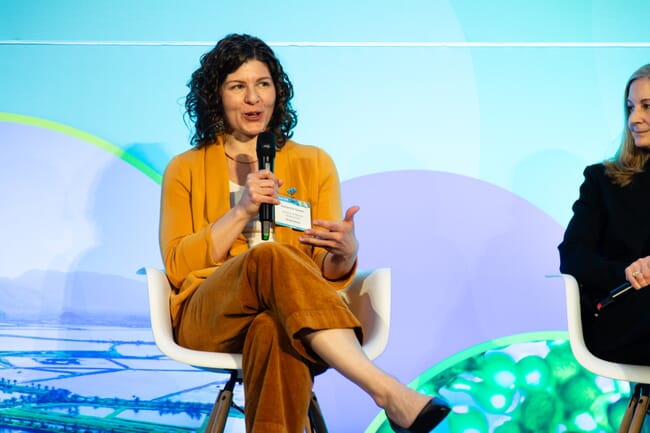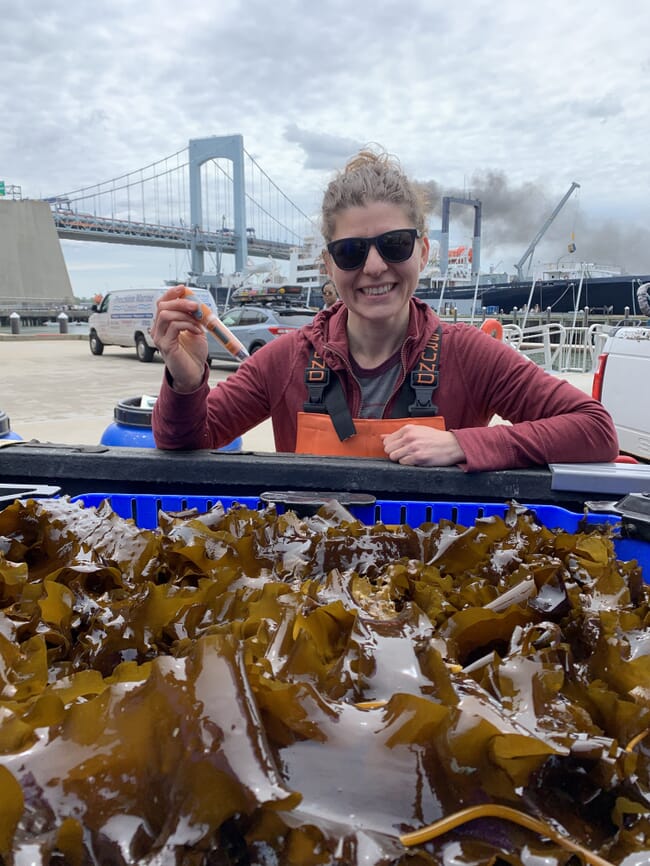
© GreenWave
The programme is led by GreenWave with key partners Unilever Foundry and kelp ingredient supplier Macro Oceans.
Although GreenWave – a North American nonprofit that has long championed regenerative ocean farming – has traditionally focused on food systems, the organisation currently sees strong momentum and potential in personal care.
“Beauty brands already use seaweed, but usually wild-harvested,” explains Samantha Garwin, GreenWave’s director of market development. “What’s missing is a reliable regenerative supply chain.”
She adds that retailers like Credo and Sephora are already curating “clean beauty” sections to meet demand for products that are good for people and the planet, and many brands “just get it” when it comes to kelp’s potential. .
CoLab aims to give participants access to precisely the extracts of seaweed that their products need.
“For a long time there’s been excitement around seaweed,” explains Garwin. “Farmers sell minimally processed kelp, but brands need functional ingredients that can be readily used in their product formulations. Kelp CoLab is designed to bridge that gap.”
It will focus specifically on sugar kelp (Saccharina latissima), following studies with the Dutch research group Nizo, which identified multiple beneficial properties, including antioxidant, anti-inflammatory, and antimicrobial characteristics. Additionally, these studies found that sugar kelp supports hydration and skin barrier function, contributes to a healthy skin microbiome, helps maintain a smooth texture of products like creams and serums, and even has potential applications in hair care. So why hasn’t kelp already broken into mainstream beauty?
“It’s not supply – we have plenty,” says Garwin. “And kelp ingredients exist – California-based biorefinery Macro Oceans has products on the market today. The challenge is cost and risk: R&D is expensive and emerging brands are reluctant to commit resources to new ingredients,” Garwin observes. “CoLab’s goal is to lower that barrier and give brands confidence to innovate with ocean-farmed kelp.”
By covering R&D costs and providing clinical validation, Kelp CoLab aims to reduce that risk.

© GreenWave
How Kelp Colab works
The programme has space for five to ten disruptor brands that focus on clean formulations and sustainability, with applications for the initiative open unitl 6 October.
Kickoff is scheduled for January, and the selected participants will gain access to a fully funded R&D pipeline – including lab testing, formulation development and clinical trials. GreenWave is partnering with Macro Oceans to supply refined kelp extracts in formats brands can easily integrate.
“These beauty brands don’t want raw kelp. They don’t even want minimally processed kelp,” Garwin explains. “They need stable extracts that their formulators can drop straight into products. That’s why Macro Oceans is so important.”
Meanwhile Unilever Foundry will act as an anchor partner, providing advisory input and setting specific innovation challenges for the cohort.
“Having a major multinational on board is a critical signal to farmers and brands that kelp is the future of beauty,” Garwin says.
Participants will also receive storytelling support from consultant Jane Poe, a veteran of brands like One Skin, EOS, and L’Oréal, to ensure that product narratives highlight the regenerative farming story, linking consumers to ocean farmers and ecosystems.
“We want brands to visit farms and connect consumers to real people, places and impact,” Garwin reflects.

A collaborative approach
The 10-month programme is designed to be collaborative rather than competitive. Brands will participate in regular cohort meetings to share what they’ve learnt, and also travel together to Alaska to visit kelp farms.
“The goal is collective momentum - five to 10 brands launching kelp products together,” Garwin says.
Although Kelp CoLab is focused on brand innovation, Greenwave hopes farmers will be the ultimate beneficiaries.
“Our goal is to build value chains so farmers can thrive,” Garwin emphasises. “It’s designed explicitly to increase the demand for North American farmed kelp.”
While beauty applications won’t consume vast volumes of kelp initially – extracts represent only a fraction of harvested biomass – Garwin sees it as the start of a scaling process.
“This won’t be millions of pounds overnight,” she says, “But it’s about steady growth that supports farmers long-term.”
“Success means brands have kelp-based products ready to pitch or bring to market by the end of the programme,” Garwin explains. “We want kelp to become a mainstream beauty ingredient within five to ten years.”
A model for other industries
GreenWave also envisions expanding the CoLab model into other industries, with the packaged food sector as a strong candidate. Garwin stresses that if there were a food-focused CoLab, it would take a different approach than past efforts.
“It won’t be about seaweed-centric products. It will be about seaweed as a behind-the-scenes ingredient that helps solve real food challenges, such as lowering sodium without losing flavour, improving texture, and keeping products stable. Seaweed as a problem-solving component, not the star,” she concludes. ,




